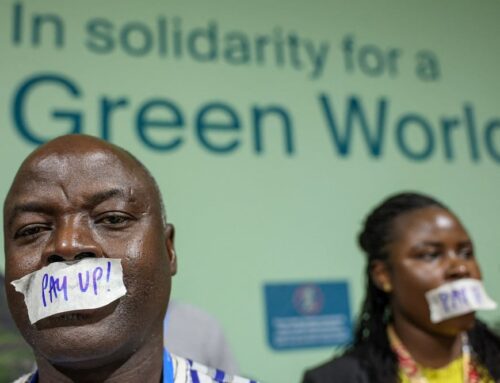Why, Amid The Horrors Of War, Ukraine Is Fighting For Nature
December 30, 2024
Asking a Ukrainian how their day is going can be a humbling experience.
“It’s been a quiet morning without a lot of explosions,” says Svitlana Grynchuk, Ukraine’s minister for environmental protection, speaking to me from Kyiv. “But we must continue to fight and to work and carry on.”
Grynchuk is the woman tasked with a seemingly impossible mission: to protect nature in a country that has been at full-scale war for two-and-a-half years. Yet however daunting that work might be, Gynchuk makes the case that, for Ukrainians, there is no separation between the human cost of war and its environmental harms. “The environment is not some abstract concept,” she tells me. “It is our world and our life. It’s the air we breathe, the water we drink, the food we grow on our land.”
But as the human toll of the conflict rises, environmental atrocities, both deliberate and accidental, continue to mount. Russia has just announced a federal emergency in occupied Crimea following major spills from at least two oil tankers in the Kerch Strait. Russia’s destruction of Ukrainian infrastructure has reconfigured much of the Ukrainian landscape, such as the demolition of the Kakhovka Dam, flooding from which destroyed settlements and ecosystems across an area the size of Indiana. Elsewhere, Kyiv estimates that 3 million hectares of Ukrainian forest have been destroyed and nearly a third of the country seeded with mines. At present, Grynchuk’s department calculates the environmental cost of the war at some $70 billion—and that’s likely the tip of the iceberg. “Including the loss of natural resources, this number could be much, much bigger,” she says.
And then there’s the war’s climate cost. At COP29 in Baku, Azerbaijan, Grynchuk accused Russia of committing “over 6,500 crimes against the environment”, producing figures showing that the war had so far generated more than 180 million tons of CO₂ equivalent emissions. The displacement of more than 6 million Ukrainian citizens to other countries has caused an additional 3.3 million tons of CO2 emissions. “This is real ecocide,” she says.
The Harvest Of War
Ecocide is an accusation that Ukraine takes extremely seriously: while the term is yet to be recognized under international law, the deliberate destruction of wildlife and natural resources is a criminal offense in Ukraine, and the country has joined island states Vanuatu, Fiji and Samoa in calling on the ICC to recognize ecocide as an international crime. Grynchuk views such recognition as a key step towards holding Russian president Vladimir Putin fully responsible for every aspect of the invasion.
“We already see what happens when the world turns a blind eye to Putin’s crimes,” Grynchuk goes on. “Before 2014, Crimea was a paradise resort and a place for people. Now, 10 years after its capture, the peninsula has turned into one massive military base.”
Grynchuk tells me she grew up in a small village in the Carpathian mountains, surrounded by nature. “For me, forests symbolize a happy childhood,” she says. “But today, they are battlefields.” Her tone conveys a heartbreak common to many Ukrainians: Grynchuk explains that, as an agrarian nation, love for the land has been passed down through generations. Some 60% of Ukraine’s territory is made up of highly fertile chernozem, or black soil—the source of Ukraine’s agricultural riches and the reason why, according to the government, the country can continue to feed 400 million people in 100 countries, in spite up to 30% of that land having been seeded with deadly mines. Food production, says Grynchuk, is a key reason why “the safety of Ukraine’s environment is not only in our own interest.”
At 39, Grynchuk is no newcomer to this fight: armed with a PhD in agrarian economics and coming from a career in agricultural policy, in 2016 she became director of Ukraine’s Department for Climate Change and Ozone Protection, representing the country at the UN’s COP summit in Marrakech. Since the Russian invasion in February 2022, she has used the annual climate conference to draw attention to the environmental damage being done by the war. Then in September, she stepped into her current role, as minister of environmental protection and natural resources. In November, at COP29, her theme for the Ukraine pavilion was one of restoration: restoration of the country from war, and restoration of the planet from the depredations of human activity.
At the geopolitical level, the function of Grynchuk’s message is to ensure continued support for the Ukrainian cause. Russia is cast as the anti-environmental destroyer, hell-bent on rapacious domination both of Ukraine and of the natural world. After all, the logic goes, how can European states with pro-environmental agendas look away when a literal war of environmental destruction is being waged on their doorstep?
The Long Game
But Grynchuk’s message also has a more specific, strategic function: Ukraine’s case for accession to the EU can be bolstered by alignment with European environmental priorities. From its deployment of renewable energy infrastructure to the planting of some 600 million trees, doing and being seen to be doing green things is intended to put Kyiv on the same environmental page as Brussels. In its 2024 report, the European Commission’s Directorate-General for Neighbourhood and Enlargement Negotiations lists in detail the areas in which Ukraine is on course to meet European requirements for accession to the bloc, and offers recommendations on how the country can improve its governance in relation to EU rules. In dry tones, the report notes that “Ukraine has some level of preparation in the field of environment and climate change”, but urges more action in the areas of “horizontal environmental legislation” and “progress towards an effective carbon-pricing mechanism”.
Such admonitions can seem jarring, even petty, in the light of Ukrainian president Volodymyr Zelensky’s announcement this month that 43,000 of his country’s troops have been killed since the invasion began. It is not known how many civilians have died, but the UN puts the toll at at least 12,000. Meanwhile, Russia claims its troops are now advancing rapidly in the east of the country, and North Korea has sent troops to support Russian forces in the Kursk border region. Now, an incoming Trump presidency in the US has many fearing that crucial funding and supplies could be cut off just as they are most needed.
On this last point, Grynchuk is surprisingly sanguine: “I think US people will continue to support Ukraine, because all civilized countries understand that Russia broke and is breaking all the rules,” she says. She vividly recalls being at COP22 in Marrakech in 2016 when Trump withdrew the US from the Paris Agreement. And yet, despite Trump’s threats to withdraw from NATO, his apparent contempt for Ukraine’s president, and his historical affinity for Putin, Grynchuk says that Ukraine will have “a lot of topics for discussion and implementation with the new US administration.”
Such stoicism could be viewed as a basic job requirement for any Ukrainian official. Grynchuk, like other Ukrainians, has a penchant for quoting talismanic British wartime leader Winston Churchill who, when asked to cut funding for the arts in favor of the war budget, reportedly responded: “Then what are we fighting for?” Such logic, Grynchuk says, sustains her determination to fight for Ukraine’s environment.
Recalling again 2023’s destruction of Kakhovka Dam, she points out that “even in the darkest times, nature recovers.” In the aftermath of the flooding, Grynchuk says nature is returning to the wetlands around the Dnipro River at a rate that has astonished ecologists. “It could have been a wasteland, but a willow forest has grown there,” she tells me. Such rejuvenation in the face of annihilation reminds her of Ukrainian resilience, and offers much-needed hope. “We plant trees in shell craters and collect honey from mined fields,” she says.
Search
RECENT PRESS RELEASES
Related Post



